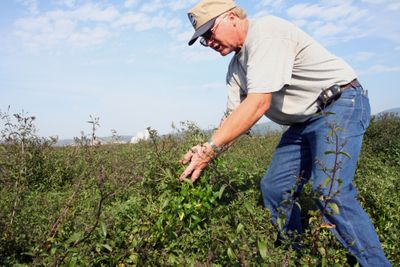Mint fields imprint Rathdrum prairie
Though difficult to grow, farmers cultivate peppermint as they diversify crops to keep farms going

Breathe deep and you can almost taste it in the air this time of year driving across the Rathdrum Prairie.
It’s sticky and sweet, like a starlight mint melting on the tongue.
“Lots of people love it and lots of people don’t like it,” Wade McLean said as his Suburban bumped along a rutted dirt road between fields of peppermint growing as tall as his vehicle’s tires.
McLean doesn’t really care for mint.
The smell doesn’t bother him much when he’s swathing the fields at harvest time, but at the still – where the plant is cooked until oil is released from its leaves – it’s too strong for the 58-year-old farmer.
He’s happy the still is a mile from his house.
McLean and neighbor Terry Nichols are the only two mint farmers in North Idaho, with hundreds of acres of the pungent plant growing between the two of them.
Nichols and his brother, who grow the majority of mint on the Rathdrum Prairie, are already harvesting crops. McLean plans to start harvest next week.
That’s after the county fair. One of his grandsons is showing steers.
For 30 years, McLean has been the manager for Satchwell Farms. His wife’s family has been farming up to 1,000 acres on the prairie for generations.
Wanda and Wade McLean are the sixth generation.
“This is the eighth,” McLean said of 4-year-old grandson Cole Cooper, who tagged along Monday, pointing at a hawk soaring above the field (“Biggest bird ever.”) and wrinkling his nose after Grandpa Wade handed him a mint leaf to smell.
“Peeeeyew,” Cole said.
Like grandpa, like grandson.
Mint is a difficult crop, McLean says. He started growing it 15 years ago to better his soil, not long after Nichols planted his first crops of peppermint.
McLean used to grow bluegrass. It wasn’t just the field-burning controversy that has him looking to other crops.
With the costs of fertilizer and fuel rising, bluegrass is not the money crop it used to be.
He’s experimenting with ragweed. Pollen from the plant will be harvested and sold to be made into allergy tablets, McLean said.
“You have got to diversify and do things to make money so you can still survive,” he said.
He raises wheat, hay and cows, along with the mint.
Mint is fickle and frost is a killer.
The plant likes hot weather, lots of water and takes a good deal of fertilizer. He’s sprayed three times already this season to kill off army worms and grasshoppers.
A single acre will yield up to 100 gallons of peppermint oil. McLean’s contract with a Yakima-area mint broker gets him $13 a gallon.
Empty 55-gallon drums sit outside his still where the railroad tracks cross Highway 41.
Once the plants are swathed, dried in the sun and collected into five-ton bins, they are brought to the still.
The plants are cooked with steam from a 600-horsepower natural gas boiler. The steam rises into eight-inch lines that feed into condenser cans where the water collects and the oil rises to the top.
It’s hauled off in the drums and eventually mixed with cheaper mint products from India and other places to become the scent and flavor in everything from candy and gum to toothpaste and mouthwash.
Once the water and oil are steamed out of the plants, the sludge left behind shouldn’t smell like mint.
If it does, it means they didn’t get all the oil, McLean said.
The sludge comes out of the bins looking like a giant loaf of bread, dumped into fields where it’s eventually worked back into the ground as compost.
Sometimes, the cows eat it even though it has no nutritional value.
Funny, McLean says. Sometimes they’ll eat from one pile and not touch another.
Just like people: Some like it and some don’t.